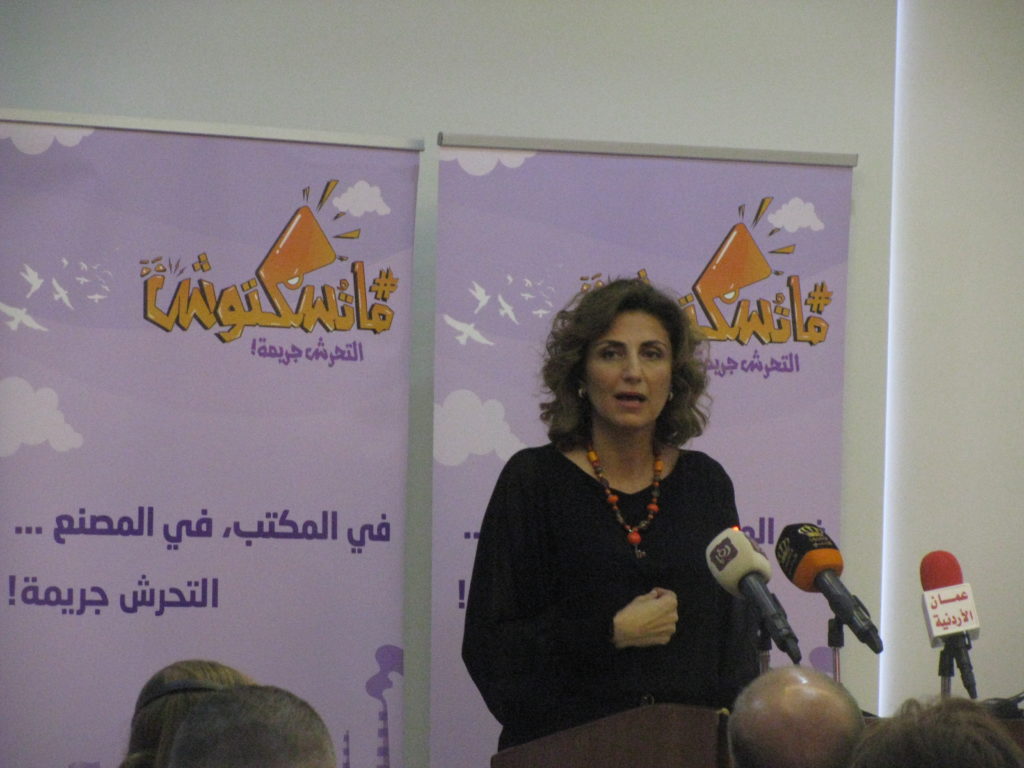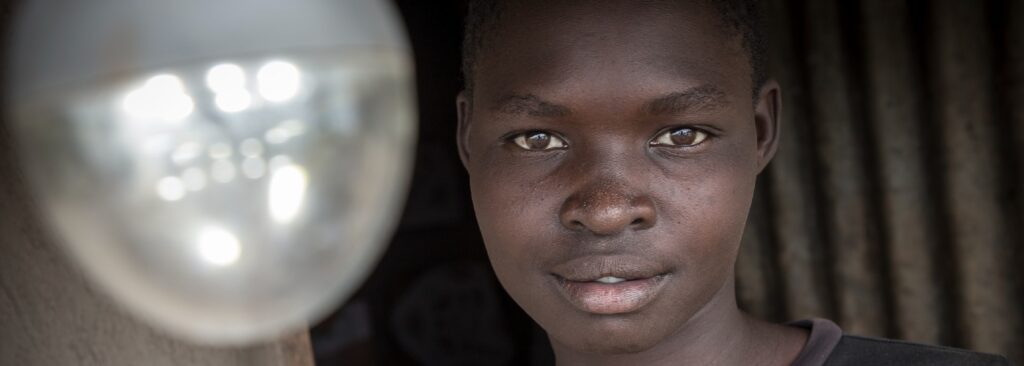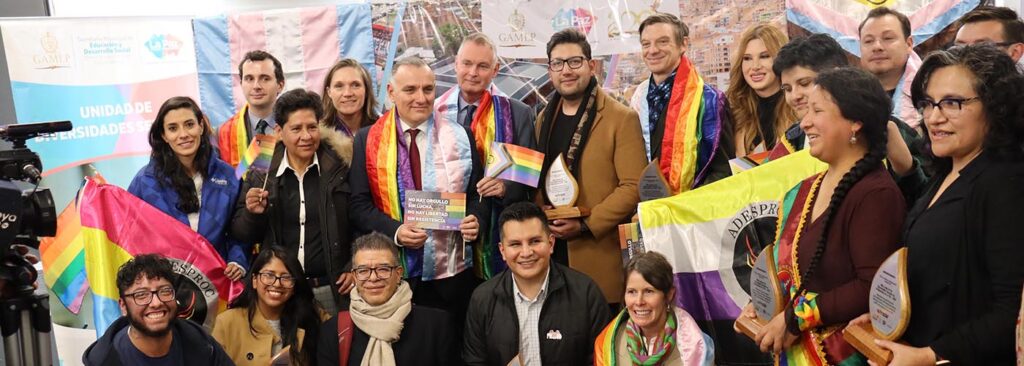id=”637″ id=”post-1943″ class=”wp-post-content-block ” itemscope itemtype=”http://schema.org/BlogPosting” itemprop=”blogPost”>
“Speak up, harassment is a crime”
By: Shara Jazzar
Within the framework of the inauguration of the 16 Days of Activism Against Gender-Based Violence in Jordan on 25 November, and as part of the Hivos Women Empowered for Leadership (WE4L) program, the event was the occasion for the Jordanian National Commission for Women (JNCW) to launch the results of a study on Sexual Harassment in Jordan.
“There is a state of denial regarding this issue, especially in conservative areas. If we do not show numbers, we won’t know the size of the problem,” commented Salma Nims, Secretary General of JNCW. The study – conducted on a sample of 1,366 persons of which 322 perpetrators of actual harassment – demonstrated that 75.9% of respondents were exposed to one or more acts of harassment – which include nonverbal or suggestive gesturing, verbal, physical, cyber and psychological harassment. Despite the shocking reality, an important number of these women choose to remain silent on account of the culture of shame widespread in our societies, which actually blames the victim and considers that she was either “wearing inappropriate outfit or going out at an improper time for a woman,” commented Nims. However, statistics had a different say. According to the study, clothes worn at the time of aggression were ‘casual short clothes or tight’ at home in 42% of the cases, and ‘casual with hijab’ in public places, work and educational institutions in 35.1% of the times. Nonetheless, “harassers still try to use the argument of provocative clothes to try to justify their acts,” underlined Nims.
Additionally, the conclusions of the study confirm that prevailing social attitudes and practices – hostile towards women – render the practice of sexual harassment acceptable and tolerated, and create obstacles to the detection of these acts and behaviors, as well as reporting them. Furthermore, even though there is some progress in regards to legislation – such as revoking article 308 of the Penal code in April 2017 that allowed sexual assault perpetrators to escape punishment by marrying the victims – the main issue in Jordan remains the denial of such acts taking place, and quite frequently. An example on that is the Facebook statement of MP Mosleh Tarawneh who criticized the 16 Days Campaign, saying that “sexual harassment is not the problem in Jordan, but foreign funding,” indirectly linking NGOs working on such gender-based violence to foreign agendas and triggering an online discussion with a number of persons who supported his views.
When faced with harassment, a major challenge that women and girls endure is the official procedure – which violates their privacy without offering any type of protection, takes too long and, thus, does not encourage them to report it. As a consequence, the vast majority of respondents did not file a formal complaint against their aggressor, resulting in impunity for the latter and the risk of repetitive harassment towards the same woman or girl or other persons. Not speaking up emerges as well from a lack of knowledge and awareness of what harassment is, and the inability of victims to find someone willing to listen to them without prejudices or harm.
Consequently, that is where the importance of the five videos produced by JNCW for the 16 Days Campaign and intended to be shared on social media platforms lays. Each of them explains situations that fall under harassment in the following categories: nonverbal or suggestive, verbal, physical, cyber and psychological. Even people with a certain level of awareness on that matter found the videos useful as they answered questions and clarified situations that some might classify as falling in the grey zone.
Also, a regional experience from Lebanon was shared on how to use the media to increase awareness on sexual harassment – in particular through videos. Relying on such tools not only widened the outreach but also created a widespread debate on the topic throughout the region. Moreover, the videos underlined the need for innovative tools that increase awareness and maximize outreach on sexual harassment.
On another note, a specialized workshop on “interventions to prevent harassment” was organized by JNCW on 1 December, with the participation of decision-makers and civil society representatives.
Most participants agreed that women who dare to report harassment often lose their case for a number of reasons such as fear, which makes them change their narrative in front of the judge and affects their credibility. This is exploited by the defense lawyers of the aggressor in order to ‘prove his innocence’ and accuse women of ‘making everything up.’ In addition, females who resort to court often “receive unsolicited and harmful advice from different people, which negatively impacts their case,” highlighted Judge Amjad Al-Kurdi. A major issue was underlined during the session as well, that of the fear of women and girls to lose their freedom to go to school, university, work or shopping if they mention that they have faced some type of harassment in front of their families.
This leads us to say that females are not only victims of their harassers but also of the society they live in – which nurtures their persecutors as well – as the local culture often blames women for any harm they face, making them unable to complain out of fear of losing the little freedom they have gained.
Coming out, a participant shared a personal harassment experience she experienced while travelling from the USA to Jordan. After reporting her harasser to a crew member and seeking protection from him, she was told her that was her problem and didn’t receive any assistance. This story highlights the importance for women to be able to seek but also receive protection when needed, as well as the urge to develop protection tools.
In this context, another participant told the sad story of an 11-year-old girl who was forced by her parents to drop-out from school and work in a popular café instead. After being sexually harassed by young men working with her, she informed a family acquaintance about what happened to her, but the latter refused to tell her father. As a consequence, she drank poison and died. Would the poor girl have committed suicide if the man had listened to her and protected her?
In parallel, an important economic aspect is left out when discussing sexual harassment faced by women, in particular in the workplace. Such molestation leads to the decreased access of females to the job market, as the only solution to protect themselves is to quit their work. This negatively impacts their autonomy, productivity and financial independence. However, the problem does not end here. Since women constitute almost half of the Jordanian population, their non-participation in the workforce has an adverse effect on the national economy as well, in addition to the income of their families.
To conclude, despite the denial of the existence of sexual harassment in Jordan, the study conducted by JNCW demonstrates the wide scope of this social phenomenon in the Kingdom. Moreover, numbers show that the majority of Jordanians – both males and females – have been the victims of some form of harassment at one point in their life, whether they were aware of it or not. It also sheds the light on the need to call for legislations that protect women – in particular in the workplace – in addition to raise awareness on that issue through videos, trainings, workshops, discussions, stickers and others, in order to empower women and girls and enable them to speak up.




